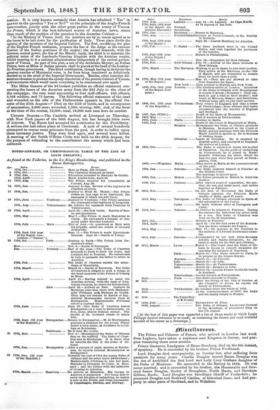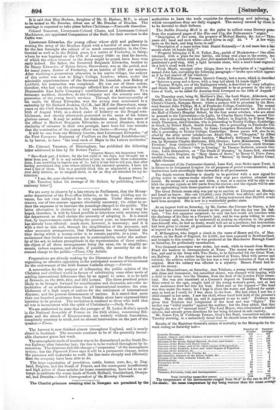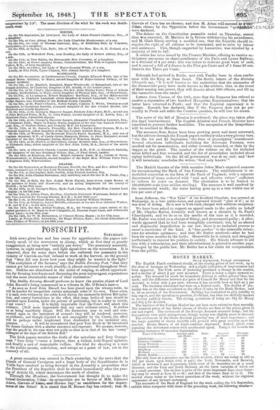The Prince and Princess of Parma, who arrived in London
last week from Leghorn, have taken a residence near Kingston in Surrey, and pur- pose remaining there some months.
Prince Gustavus, Landgrave of Hesse-Homburg, died on the 8th instant, of apoplexy. He is succeeded by his brother, Prince Ferdinand.
Lord Douglas died, unexpectedly, on Sunday last, after suffering from paralysis for many years. Charles Douglas second Baron Douglas was the son of Archibald the first Lord and Lady Lucy Graham daughter of the Duke of Montrose. He succeeded to the Barony in 1844. He was never married; and is succeeded by his brother, the Honourable and Rev. rend James Douglas, Rector of Broughton, North Hants, and Marsham Gibbon, Bucks. Lord Douglas was hereditary Sheriff of Forfarshire ; he possessed Douglas and Bothwell Castles' of historical fame; and had pro- perty in other parts of Scotland, and in Wiltshire.
It is said that Miss Hudson, daughter of Mr. G. Hudson, M.P., is about to be united to Mr. Dundee, eldest son of Mr. Dundee of Dundee. The marriage is expected to take place before Christmas.—Newcastle Guardian.
Colonel Somerset, Lieutenant-Colonel Cloete, and Lieutenant-Colonel Mackinnon, are appointed Companions of the Bath, for their services in the Caffre war.
Lieutenant Edwardes, the young officer whose skill and gallantry in routing the army of the Moultan Rajah with a handful of men have been for the last fortnight the subject of so much commendation in the Con- tinental as well as in the British press, is a native of Frodesley, in Salop; where he was baptized on the 17th of January 1820: so that his laurels, of which the oldest General in the Army might be proud, have been won early indeed. His father, the Reverend Benjamin Edwardes, brother to Sir Henry Edwardes, of Ryton Grove, Shrewsbury, was at the period, and for many years, Rector of Frodesley, at an income of 3701. per annum. After receiving a preparatory education in his native village, the subject of this notice was sent to King's College, London • where, under the admirable superintendence of the Reverend Dr. Lonsale, now Bishop of Lichfield, his instruction was completed. He was one of those cadets, therefore, who had not the advantage afforded him of an education in the Honourable East India Company's establishment at Addiscombe. To a fortunate accident, therefore, do the Company and the country owe the possession of the young hero's services. Through the instrumentality of his uncle, Sir Henry Edwardes, was the young man nominated to a cadetship by Sir Richard Jenkins, G.C.B., late M.P. for Shrewsbury, many years on the Civil department in India. He was passed and sworn on the 26th of August 1840, as a direct cadet of Infantry on the Bengal esta- blishment, and shortly afterwards proceeded to the scene of his future glorious career. It may be added, for distinction sake, that the name of the officer is Herbert Benjamin Edwardes; as several directors, from a similarity of surname in their own proteges, have been led into mistake that the nomination of the young officer was theirs.—Morning Post.
It will be seen from our Military Gazette, that Lieutenant Edwardes, "of the First European Regiment of Fusiliers on the Bengal Establishment," is, by brevet, to have "the local rank of Major in the Lahore territories."
Mr. Edmund Taunton, of Birmingham, has published the following letter addressed to him by Sir Robert Peel- " Drayton Manor, 8th September 1848. "Sir—Each post, I believe, for the last eight or ten days, has brought me a letter from you. If it is any satisfaction to you to continue these communica- tions, I am unwilling to deprive you of it; but it is but fair to tell you, that after having ascertained that your letters related to the currency question, I have not read a line of them. You in.iy possibly think this so ungrateful a return for your daily labours, as to suspend them, so far as they are intended for my in- etraction.
"I ani, Sir, your obedient servant, ROBERT REEL." [Mr. Taunton takes his revenge of Sir Robert, by publishing another currency letter !]
We are sorry to observe by a late return to Parliament, that the Money- order department of the Post-office hitherto, so far from yielding any re- venue, has not even defrayed its own expenses. Under these circum- stances, one of two courses appears absolutely necessary, viz, either to re- duce the expenses or to increase the poundage charged to the public. The latter alternative is obviously a very undesirable one; and it may be hoped, therefore, it will be found possible to introduce such economy into the department as shall obviate the necessity of adopting it. It is stated that, by improvements made during the present year, an important saving has already been effected: much more, however, is necessary; and it is with a view to this end, through the simplification of the accounts, and other economic arrangements, that Parliament has recently limited the time during which a money-order is to remain payable, to a year. We understand that further measures are in contemplation, under the author- ity of the act, to induce promptitude in the representation of these orders; the object of all these arrangements being the same, viz, to simplify ac- counts, reduce expense, and obviate, if possible, the necessity for an in- creased charge to the public.—Times, City Article.
Preparations are already making by the Dissenters of the Metropolis for organizing an effective opposition to the anticipated measure of Government for the endowment of the Irish Roman Catholic clergy.—Patriot.
A convention for the purpose of influencing the public opinion of the Christian and civilized world in favour of substituting some other mode of settling international differences than by an appeal to arms, is to be held at Brussels, on the 20th, 21st, and 22d instant. The three practical points likely to be brought forward for consideration and discussion are—the in- troduction of an arbitration-clause in all international treaties; the esta- blishment of a high court of nations for the settlement of international disputes; and the general disarmament of nations. It is stated that more than one hundred gentlemen from Great Britain alone have expressed their intention to be present. The invitation is confined to those who hold that all war is inconsistent with the spirit of Christianity.—Dally News.
We are authorized to state that the passages of M. Ledru-Rollin's speech in the National Assembly of France on the 25th ultimo, concerning Bel- gium and the attack of Risquons-tout, are entirely without foundation, completely contrary to truth, and an absurd intervention on the part of the speaker.—Times.
The harvest is now finished almost throughout England, and is nearly closed in Scotland. The accounts continue to be of the generally favour- able character given last week.
The atmospheric mode of traction was to be discontinued on the South De- von Railway after Saturday last; the line is to be worked throughout by lo- comotives. The directors call this change a" suspension" of the atmospheric system; but the Plymouth Times says it will be a permanent change, unless the patentees will undertake to work the line more cheaply and efficiently than the company have been able to do.
The large exportation of provisions, cattle, butter, corn, &c., to Eng- land, Belgium, and the South of France, and the consequent insufficiency and high prices of these articles for home consumption, have led to an at- tempt to cultivate the waste lands of North Holland, Guelderland, Overys- Bel, and Dreuthe.—Dutch Correspondent of the Morning Chronicle.
The Chartist prisoners awaiting trial iu Newgato are permitted by the
authorities to have the tools requisite for shoemaking and tailoring, in which occupations they are daily engaged. The money earned by them is to be devoted to their defence.
The _Dublin Evening Mail is at the pains to collect some literary gems from the scattered pages of the Hue and Cry, the Policeman's " organ." "Description of two cows, the property of Michael Hurley. &c. 1st.—' Three years old; head and neck white—short horns in calf. 2d. * A few white spots on the back, and long horns in calf.' " Description of a mare stolen from Daniel Kenneally—' A red mare has a had month about 14 hands high.' " -ea " Property belonging to R. G. Talbot, Esq., parish of Monkstown—' One silver inkstand with a place for two bottles, one being oval glass in the centre, two grooves for pens which stood on four fret marked with a cockatrice's crest I "A gentleman's gold ring, with a light lavender stone, with a man's head engraved on a lady's small work-box.'" "From Meath, amongst other things, there is a description of a vagabond,' named John Lee, containing the following paragraph—' brown eyes which appears as if be had shaved off his whiskers.'
"John kl`Namara, of Farnans, Queen's County, lost a mare which is described as 'between a pony and a horse, with a long tail about 14 hands high!" "Thomas Wright, one of the Ballingarry rebels, is described as very talkative, and thinks himself a great politician. Supposed to be at present in the city or Cove of Cork, as he sailed for America from Liverpool on the 18th of August."
On Thursday next, being St- Matthew's Day, the Lord Mayor, Aldermen, and Sheriffs, with the Governors of the Royal Hospitals, will attend divine service at Christ's Church, Newgate Street; where a sermon will be preached by the Reve- rend Samuel John Phillips, MA. of Pembroke College, Cambridge. The annual orations on the benefits of the Royal Hospitals will afterwards be delivered in the Hall of Christ's Hospital School, by the four senior scholars, who are about to proceed to the Universities;—in Latin, by Charles Deere Craven, second Gre- cian, who is proceeding to Lincoln College Oxford; in English, by D'Arcy Went- worth Thompson, third Grecian, who is proceeding to Trinity College, Cambridge; in Greek, by Robert Black, fourth Grecian, who is proceeding to Pembroke Col- lege, Cambridge; and in French, by James Lempriere Hammond, first Grecian, who is proceeding to Trinity College, Cambridge. Seven poems will also be re- cited by the other senior scholars—an Alcaic Ode on "Cleopatra," by Alfred Sweeting, tenth Grecian; Greek Iambics, " Manfred's Soliloquy," from Lord By- ron, by Hermann Charles Heilbronn, fifth Grecian; Latin Hexameters, "British Freedom," from Goldsmith's "Traveller," by Lawrence Craven, sixth Grecian; Greek Sapphics, Collins's "Ode to Evening," by Thomas Holbrow, seventh Gre- cian; cian ; Latin Hexameters, on "The Death of Socrates," by James Gill, eleventh Grecian; Latin Elegiacs, on "Mary Queen of Scots," by Henry C. Pryce Jones, twelfth Grecian; and an English Poem on "Borneo," by George Hector Clued, eighth Grecian.
By command of the Postmaster-General, Lane End, near Stoke-upon-Trent, is in future to be designated Longton for all purposes of postal communication; ADA instructions have accordingly been forwarded to all postmasters.
The South-western Railway is shortly to be provided with a new signal for giving notice to express-trains whether they may pass stations situated near curves. By means of a crank and wires, a man at a station will be able to ex- hibit the proper signals at 600 yards from the station; and the signals will be Been by an approaching train three-quarters of a mile further.
The Great Britain steam-ship was put up to auction at Liverpool on Monday, and found no buyer. She cost 125,0001.; only 20,0001. was offered; and she was bought in at the nominal sum of 40,0001., it being understood that 30,0001. would have been accepted. She is now in a wonderfully perfect state.
At an inquest held on Saturday, by Mr. Carter, the Coroner for Surrey, a Jew who had been summoned was excused on the ground that the day was his Sab-
bath. "The Jew appeared surprised: he said the fact would not interfere with
the discharge of his duty on a Coroner's jury, and he was quite willing to serve. The Coroner said, he must be understood as making no objection to the gentle- man himself, who, he had no doubt, would well act as a juryman; but instructions had been given to excuse all gentlemen of his persuasion attending as jurors at at inquest on a Saturday."
F.111.‘Naughton, who forged a check in the name of Henry and Co. of Man- chester, on the Bank of England, for 3,5001., has been captured in Newfoundland, and brought to this country: he was produced at the Manchester Borough Court on Saturday, for preliminary examination.
Two thousand sovereigns were stolen, last week, while in transit from Messrs. Praed the bankers to correspondents at Truro. The money was enclosed in a box, and sent to the Swan with Two Necks, to be forwarded via the Great West- ernRailway. A box rather larger was received at Truro, filled with pewter and rubbish: the address written on the box was a very good Imitation of that on the original. How the robbery was effected is a mystery. Messrs. Praed had in- sured the money.
At the Mansionbouse, on Saturday, Ann Trinham, a young woman of respect- able dress and demeanour, but somewhat absent, was charged with leaping, with a child in her arms, into the Thames, from the deck of the London Pride steam-
boat. She was also examined at a Coroner's inquest on Tuesday. Waterman Brice rowed to the spot, caught hold or the young woman's gown and at last
with assistance drew her into his boat. Brice said at the inquest!--" Her head was then under the water; but I kept it above the water, and hallooed for assist- ance as loud as I could, for I was alone in the boat. She had when I saw her a child clasped in her arms. I saw the child, whose hand held hold of the prisoner's dress. She let the child go, and it appeared to me to sink." Evidence was given that Trinham had complained of her head and was "flighty." The verdict was "wilful murder" against the mother; but the Jury added, that they thought she was of" unsound mind." The Lord Mayor, who entertained a similar opinion, had already given directions for her being detained in safe custody. Mr. James Pye, of Calthorpe Terrace, Gray's Inn Road, committed suicide on Tuesday morning, in a melancholy dread that he should come to the workhouse.
Results of the Registrar-General's return of mortality in the Metropolis for the week ending on Saturday last— 1 ... • 8
91
Total (including unspecified causes) 1020 972
The temperature of the thermometer ranged from 96.4° in the sun to 38.2° 111 the shade; the mean temperature by day being warmer than the mean average
Zymotic Diseases Dropsy, Cancer, and other diseases of uncertain or variable seat ..
Tubercular Diseases.
Diseases of the Brain, Spinal Marrow, Nerves, and Senses.
Diseases of the Heart and Blood-vessels Diseases of the Lungs, and of the other Organs of Respiration... Diseases of the Stomach, Liver, and other Organs of Digestion Diseases of the Kidneys, ite Childbirth, diseases of the Uterus, lice.
Rheumatism, diseases of the Bones, Joints, ,fic Diseases of the Skin, Cellular Tissue, fie Malformations Premature Birth 10 Atrophy 18 Age Sudden VioLence, Privation, Cold, and Intemperance Number of Summer Deaths. Average.
418 .... 257 81 .... 45 184 102 .... 120 32 86 55 12 .... 8 11 9
roilearze by 2.3'. The mean direction of the wind for the week Was South-




























 Previous page
Previous page